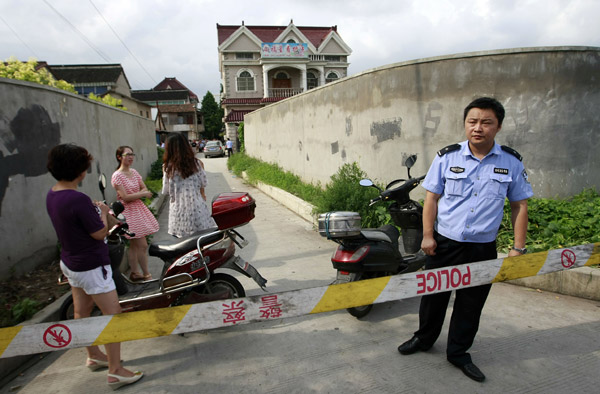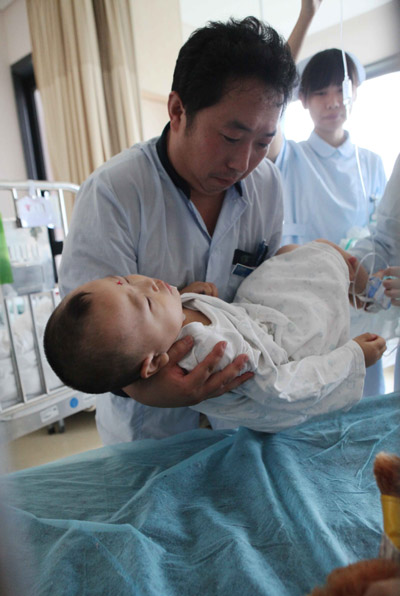Educating children in boom cities is becoming more difficult, Wang Hongyi and Li Xinzhu report in Shanghai.
Migrant workers face many obstacles when they move to big cities like Shanghai. Educating their children is one of them and it just gets harder.
 |
|
A guard line is set up near a day care center where an attack occurred in August, injuring eight children. The line is meant to prevent people who aren't approved by authorities to be in the day care from entering. [Photo/China Daily] |
Migrant workers often find themselves in a dilemma when they try to send children to kindergarten or preschool. They don't have hukou, official residence permits, that allow them to enroll their children in public kindergartens. Private schools are out of the question as they don't earn enough money to pay the fees.
The situation is exacerbated as the number of children of migrant workers dramatically increases in big cities.
According to research from the Shanghai municipal people's congress standing committee, Shanghai had 1,252 kindergartens at the end of 2010. Nearly 70 percent of these were public kindergartens.
By 2012, these kindergartens are expected to have 500,000 children, 200,000 will be children of migrant workers, a huge increase from the current 80,000.
In response to the dearth of education opportunities, entrepreneurs have taken to opening illegal or unlicensed day care centers or kindergartens. But rather than meeting these families' demand for schooling, such places often lack the resources needed to provide a good education and meanwhile are full of hidden dangers.
Xiong Bingqi, deputy director of the Beijing-based 21st Century Education Research Institute, said the government does not put enough money into schools.
"Consequently, schools specifically established for these migrant kids have emerged," Xiong said. "Among them are schools that aren't qualified (to be teaching children) or that lack good teaching staffs. Unhygienic conditions and poor security only make things worse. These schools exist in the gray area of education."
Safety concerns in recent years have prompted cities throughout the country to close many of these informal schools and nurseries, which does nothing to help migrant parents find a way to educate their children.
Recent attack
Just how dangerous these institutions can be was made evident in August, when eight children were hurt in a knife attack that occurred in a day care center in Shanghai's suburban Minhang district. A woman worker at the center was later detained on the suspicion that she had committed the crime.
More than a week later, Li Xingfa said he still can't help shuddering when he imagines what would have happened to his 5-year-old boy had he been a victim of the violence. Li said his son was enrolled at the day care center that day but, at the time of the attack, was in a different room than the assailant.
"I never thought that this would happen," Li said. "It's so terrible."
Li said he began sending his son to the day care center at a cost of 300 yuan ($47) a month after someone from his hometown recommended it to him.
"The fees charged by other kindergartens are very expensive, so we decided to send my child here," Li said. "But who would have thought such a thing could happen? And who would dare to send their children to that center again?"
After the attack, Li said he took the advice of local education authorities and began sending his son to a private kindergarten. He said he can hardly afford the 600 yuan he must pay the school every month to keep his son enrolled there.
Li, who moved to Shanghai 10 years ago from Fengyang, Anhui province, makes less than 3,000 yuan a month working as a driver for a shipping company. His wife puts in more than 15 hours a day at a vegetable processing company, making 1,700 yuan a month.
Li lives in a shabby, 8-square-meter room with his wife and son in a village on the outskirts of the city and pays 100 yuan a month in rent.
To get his son to school every day, Li said he takes him on an electrical bicycle for a trip that lasts about 20 minutes.
When asked about the disadvantages, Li said they were unavoidable if he wanted to give his son a good education.
"I only hope this kindergarten will be safe," he said.
Li acknowledged that he could send his son back to his hometown for schooling. But he hesitates to do so because children there are not subject to good supervision, he said.
Li said he had once been a good student but eventually quit his studies because he was poor.
"I remember quite clearly that I couldn't afford the cost of going to school at that time," Li recalled. " I had to go out to make a living for my family."
"I hope my son takes a different path. I hope he can have a bright future like students in big cities. But it's hard to find a school that provides the good education you can get at the public schools here."
Travails of migrants
 |
|
A child who was wounded in the August attack is put under clinical observation at a hospital in Shanghai. [Photo/ China Daily] |
Wang Jun, a middle school teacher who declined to name the school where he works, said migrant laborers are shut out of many of the benefits of society.
"What we see is that migrant workers cannot get good educations, healthcare and housing," he said. "They have hard lives, although they have indeed made a great contribution to the city's development. Without hukou, they cannot receive social services in the places where they work; they have to pay higher medical fees and cannot apply for subsidized housing. And their children cannot enter public schools."
In March, Premier Wen Jiabao said in his annual government report that the country will do more to ensure citizens have equal schooling opportunities. It will also put more resources toward preschool education and ensure that children can enter kindergarten more easily.
Before that, Wen had said in an online chat that the country will reform its hukou system in ways meant to give migrant workers better lives and enable their children to attend city schools.
Hidden dangers
The August attack that Li's son narrowly avoided was the latest violent incident to be directed against children in schools and nurseries that serve migrant workers' children.
In June, a 35-year-old man working at a private kindergarten for migrant workers, also in the Minhang district, was detained on suspicion of sexually molesting five girls.
The kindergarten where he worked is a privately run preschool that charges 400 yuan a month to take care of a child. That low price has drawn parents into enrolling more than 200 children there.
Authorities are aware of the dangers.
In May, officials in Beijing's Daxing district education bureau closed about 30 illegal kindergartens that were without business permits and sanitation licenses and that mainly served the children of migrant workers.
Shanghai, meanwhile, formulated a three-year plan meant in part to help migrant workers deal with their education difficulties. It calls for money to be put toward preschool education and for the removal of some of the obstacles that hinder children from getting into kindergarten. That second goal can be achieved, the plan says, by enlarging the size of kindergartens, ensuring that students at all sorts of schools receive the same quality teaching and granting licenses to formerly unlicensed institutions that prove they meet the government's standards.
And last year, the city's education commission said it was looking at allowing children whose parents do not have residence permits to enter public kindergartens. Hearing of that proposed policy change, some local residents have contended adopting it would put even greater pressure on Shanghai's already scarce education resources.
So far, officials have neither released their conclusions nor indicated when they would put such a change into effect. In the meantime, the children of hukou holders continue to be the only ones who can get into public kindergartens.
As early as 2006, the government began to adopt policies meant to help meet the demand for early schooling.
To find more ways to accommodate migrant children, the Shanghai education commission announced in 2010 that it plans to build 100 kindergartens in three years.
But even with those new schools in full operation, there still will not be enough classroom seats in Shanghai for the 2 million children of migrant workers who are now without preschool education.
In another policy change, Shanghai has taken to regulating unlicensed or substandard preschools, which may be eventually used to supplement public and private schools. Before the new regulation, about 700 day cares had lacked licenses. About 450 of those have since met the government's standards and can legally enroll students.
A teacher surnamed Gao, who works at a public kindergarten that she declined to name, said she hopes the policies help to hold the school system up to a higher standard.
"Teachers from public kindergartens often holds a bachelor's degree and have been selected through very strict procedures," she said. "The education resources and the quality of teachers (in private kindergartens) cannot compare with those found in public schools. In some private kindergartens, the quality of education cannot be ensured. There are some staff members who don't even have an education. This is absolutely not good for the development of children."
The new kindergartens are to be built mainly in places where large numbers of migrants live, such as Baoshan district, Minhang district and Pudong New Area.
"Since the city is encouraging the construction of more private kindergartens, the quality of the instruction at these preschools should be given more attention," Gao said.
